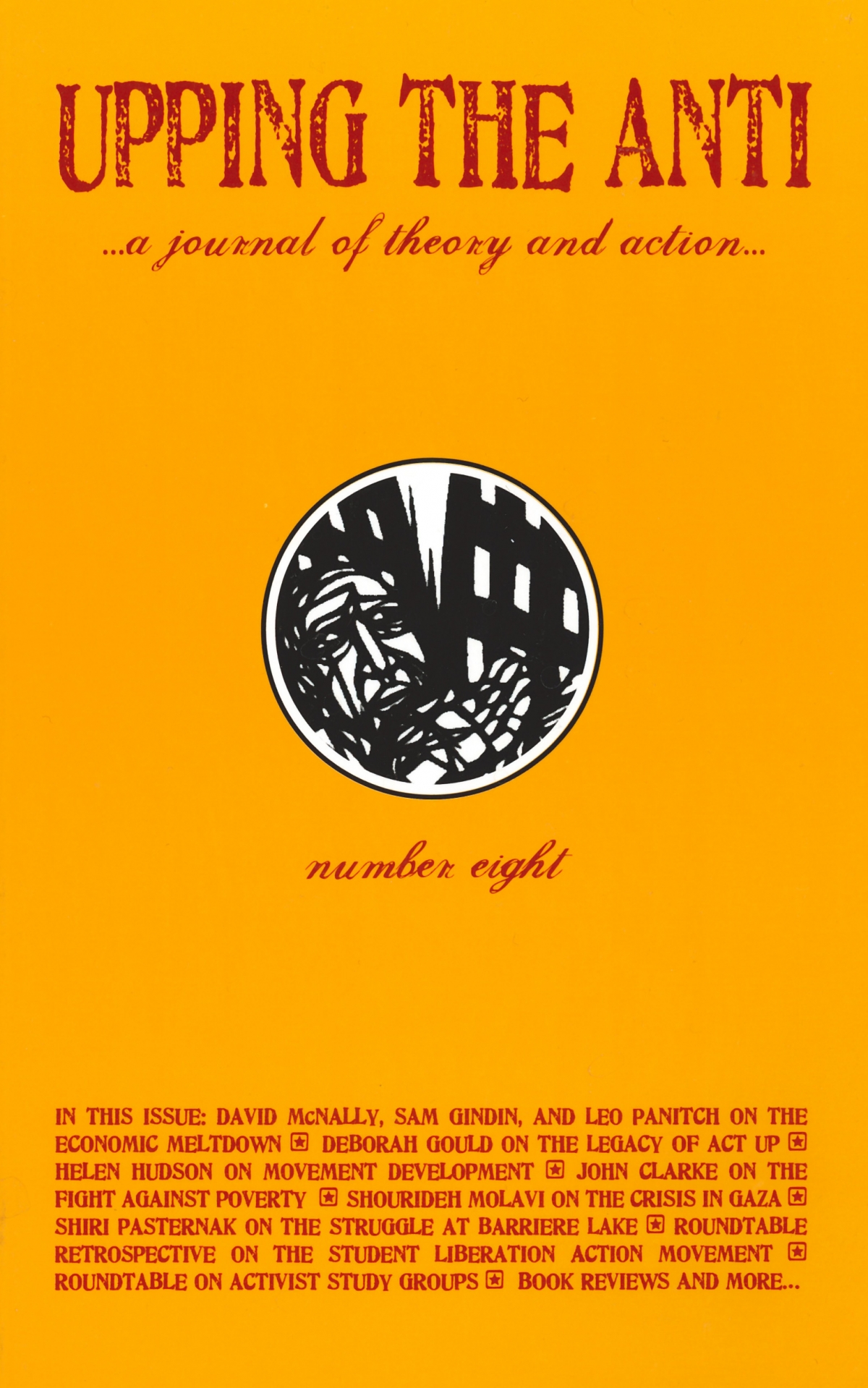Introduction
The eighth issue of Upping the Anti took shape in the midst of a storm. Of our seven editors, five were on strike for 85 days between November and February with the membership of CUPE Local 3903 at York University in Toronto. Fighting precarious work and the neoliberal university, we weathered an unmovable administration before being legislated back to work by the provincial government. This exhilarating but exhausting mid-winter, three-month strike threatened to delay our production aims.
Nevertheless, as this issue came together, the editorial process revitalized our spirits, focused our goals and compelled us to publish something useful for future struggles. In our editorial, we engage with the challenges and opportunities that arise from the global economic crisis and the election of Barack Obama. Calling attention to the ways that politicians and economists are drawing on myth to reinvigorate capitalism, we consider the enduring question of hegemony. After evaluating some of the different orientations that today’s radicals adopt when approaching this question, we outline how the left might use myths to help constitute a broader collective and radical “we.”
As always, we begin this issue with letters from our readers. Heather Hax and etienne turpin revisit the question of catastrophe in their responses to our last editorial (UTA 7). Reflecting on our interview with sex worker and organizer Kara Gillies, Simone Skye highlights the importance of adopting a labour perspective on sex work. Melissa Elliot responds to Tom Keefer’s article from last issue and offers a perspective on how non-native activists should relate to indigenous struggles. Finally, Greg Flemming responds to Neil Balan’s review of Zizek’s Defense of Lost Causes and Balan responds to Flemming.
In our interviews section, Aidan Conway talks with leading Marxist thinkers David McNally, Leo Panitch, and Sam Gindin about their perspectives on the current economic crisis. Long-time AIDS activist Gary Kinsman interviews Deborah Gould, a former ACT UP activist and author of the recently published Moving Politics: Emotion and ACT UP’s Fight Against AIDS. In our final interview, Chris Dixon interviews Montreal-based organizer Helen Hudson as part of his ongoing project to record the experiences and insights of anti-authoritarian organizers in Canada and the US.
Long-time Ontario Coalition Against Poverty (OCAP) organizer John Clarke begins our articles section with an assessment of the challenges of anti-poverty organizing and movement building during the economic crisis. Next, anti-Israeli apartheid activist Shourideh Molavi assesses the terrain for Palestine solidarity organizing in the wake of Israel’s attack on Gaza. Finally, solidarity activist Shiri Pasternak reports on the ongoing struggles of the Algonquins of Barriere Lake (ABL).
Our first roundtable discussion finds members of the Student Liberation Action Movement (SLAM) revisiting their organizing experiences in the 1990s at New York City’s Hunter College. Our second roundtable explores the merits of study groups in radical left organizing and features participants from the LA Crew, Another Politics is Possible, the Activist Study Circles, and the New York Study Group.
Katy Rose begins our book reviews section with an invest-igation of Asian Settler Colonialism (U of Hawai’i Press), an edited collection in which authors explore the complicated colonial dynamics between “locals” and the native population of Hawai’i. Ernesto Aguilar reviews Let Freedom Ring (PM Press), an edited collection of political prisoner writing, and Frank Edgewick considers the long-awaited reprint of Semiotext(e)’s Autonomia: Post-Political Politics. Finally, DT Cochrane reviews Robert McChesney’s The Political Economy of Media (Monthly Review Press).
This issue marks four years of Upping the Anti. We are pleased to welcome Erika Biddle to the editorial committee. We would like to thank former editor Nicole Cohen for her significant contributions to the journal and are pleased that she remains an active Advisory Board member.
Since 2005, we have published two journals each year, hosted public forums, and maintained an ongoing and improving web presence. We have done this with an all-volunteer collective of editors and advisory board members. Nevertheless, producing a journal is expensive and Upping the Anti is only made possible ?through your support. If you have not done so already, please consider subscribing to Upping the Anti. After all, nothing beats receiving mail! We are happy to announce that we now have a sustainer’s program whereby you can make monthly donations to the journal to ensure that we are able to continue publishing. Visit us online to get a subscription or to make a donation. All donations go directly to the production of the journal. Visit us often at www.uppingtheanti.org and stay tuned for our website relaunch this summer. We look forward to your feedback on the new site’s design and usability.
Upping the Anti number nine is scheduled to come out in October of 2009. If you are interested in contributing, please send a pitch to uppingtheanti@gmail.com. Pitches are due on or before May 30, 2009. The deadline for first drafts is July 5, 2009. For more information, please visit www.uppingtheanti.org.
We hope you enjoy this issue of Upping the Anti and we look forward to your letters, reviews, story ideas, and subscription requests.
In solidarity and struggle,
Erika Biddle, Aidan Conway, Kelly Fritsch, Tom Keefer, Sharmeen Khan, Clare O’Connor, AK Thompson
Toronto, April 2009

